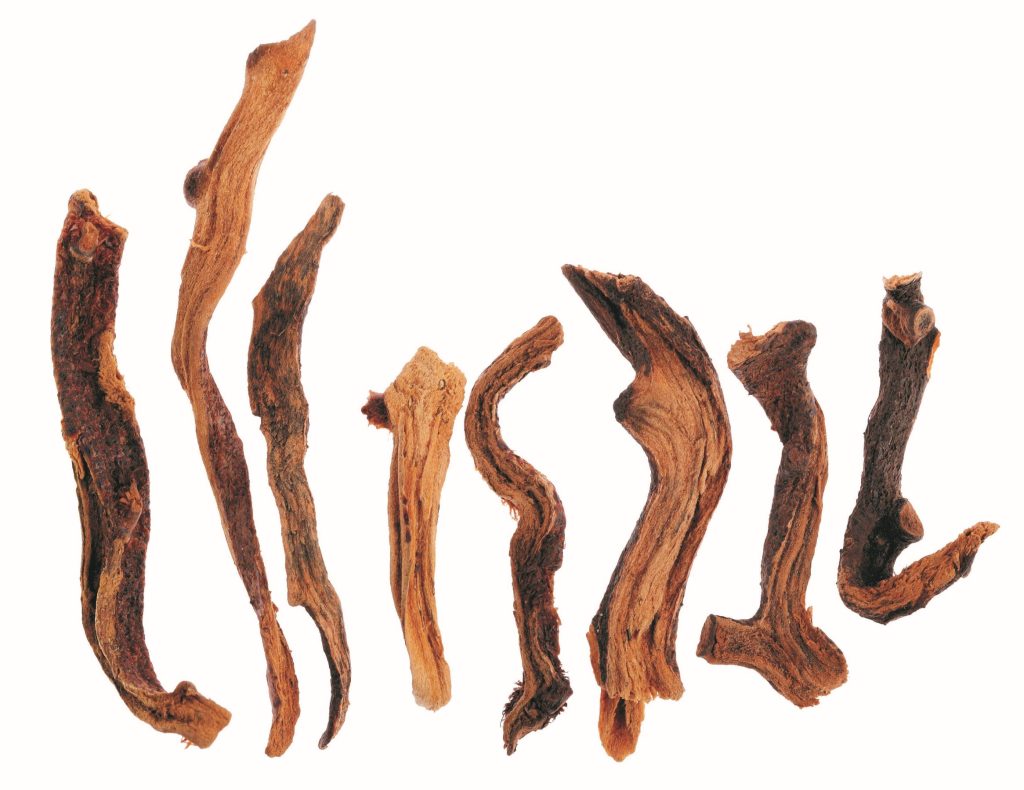Fortune's Drynaria Rhizome (Gu Sui Bu)

What is Fortune's Drynaria Rhizome (Gu Sui Bu)?
Fortune’s Drynaria Rhizome (gu sui bu, 骨碎补) refers to the roots of the Drynaria fortunei plant, an epiphytic herb that grows to a height of 20 – 40 cm. Consisting of a thin wooden stem and several branches containing green fern-like leaves, the plant is a species of basket fern in the family Polypodiaceae.
In Traditional Chinese Medicine (TCM), Gu Sui Bu is considered to be one of the most important herbs in the healing of damaged bones and ligaments. In fact, the meaning of the herb’s Chinese name is “the repairing of broken bones”.
Gu Sui Bu can be harvested all year round, but it is most commonly harvested in spring and winter. After being harvested, the leaves and scales are removed from the plant, its roots are then cleansed, moisturized, sliced and dried under the sun. The herb can be used raw or sand-scorched.
In TCM, Gu Sui Bu falls under the category of ‘Tonic herbs for Yang Deficiency’. Such herbs are used for patterns of Deficiency to replenish one’s ‘Four Treasures’ (qi, blood, yin, yang). Warm in nature, Gu Sui Bu can help individuals with too much Cold in their body, such as those experiencing a Yin Excess or a Yang Deficiency, to restore a harmonious yin-yang balance. Bitter in taste, Gu Sui Bu can cleanse the body by clearing Heat, drying Dampness and promoting elimination via urination or bowel movements. In particular, the herb targets the Kidneys, the large intestine and the Liver.
Functions and Benefits of Fortune's Drynaria Rhizome (Gu Sui Bu)
Traditional Chinese Medicine (TCM) shows that Gu Sui Bu has the following health benefits.
Gu Sui Bu can activate blood to dissolve stasis, help with fractured tendons and bones, resolve swelling and alleviate pain. The herb is thus indicated for traumatic injuries such as sprains and contusions, congestion, swelling and pain, especially in the cases of soft tissue and ligament injuries, broken bones and simple fractures. For example, Gu Sui Bu can help to treat osteoporosis and ankle injuries. Gu Sui Bu can also help to stop bleeding due to incised wounds and broken collaterals, and help the patient to regain strength after recovery of the injury. The herb is soaked in wine for both internal and external application, or made into decoction to be consumed.
Gu Sui Bu can warm and tonify Kidney yang. The herb can be indicated for syndromes caused by Kidney deficiencies such as lumbago, weakness of legs, diarrhea, tinnitus, deafness, toothache and bleeding gums. In addition, Gu Sui Bu is also used in the treatment of hair and skin problems such as alopecia areata and vitiligo. When used topically, the herb can stimulate hair growth.
Other than the above Gu Sui Bu benefits, modern studies have also suggested that Gu Sui Bu contains many antioxidant and antibacterial properties, which can help to fight oral bacteria, treat cough, typhoid fever and tuberculosis. The herb is also used to treat inflammation, arteriosclerosis, rheumatism and hyperlipidemia.

How to Use Fortune's Drynaria Rhizome (Gu Sui Bu)
The recommended dosage of Gu Sui Bu is 10 -15g, taken up to three times daily. Some healthcare providers may even recommend a larger dose of 10 – 20g if taken with water as a decoction.
Gu Sui Bu is available in many health food stores and herbal shops. The herb is available whole and dried, or in supplement forms such as pill, powder and decoction.
Cautions and Side Effects of Fortune's Drynaria Rhizome (Gu Sui Bu)
Gu Sui Bu should not be used by individuals who are experiencing Yin Deficiency or Internal Heat. Also, large quantities of Gu Sui Bu may cause side effects such as an upset stomach or poisoning.
Do note that Gu Sui Bu should not be used together with Wind-expelling herbs.
We strongly encourage you to consult your healthcare provider before deciding to add Gu Sui Bu to your healthcare routine, especially those with anaemic conditions.
Summary
Here is a summary for Fortune’s Drynaria Rhizome (Gu Sui Bu):
- Herb name (Chinese): 骨碎补
- Herb name (Pin Yin): gǔ suì bǔ
- Herb name (English): Fortune’s Drynaria Rhizome
- Herb name (Botanical): Rhizoma Drynariae
- Origin of species: Drynaria fortunei (Kunze) J. Sm.
- Part(s) of herb used: Rhizome
- Geo-specific habitat(s): Zhejiang, Hubei, Guangdong, Guangxi, Sichuan, Shaanxi, Gansu, Qinghai
- Taste(s) & Properties: Bitter; Warm; Administrates the Kidney and Liver Meridians
- Actions: Eases symptoms of erectile dysfunction, weak knees and sore lower back; Eases chronic or morning diarrhoea, and coughs that are slow to recover; Reduces swelling and relieves clots in bruises or external injuries
References
Chang, H. C., Gupta, S. K., & Tsay, H. S. (2011). Studies on folk medicinal fern: an example of “Gu-Sui-Bu”. In Working with Ferns (pp. 285-304). Springer, New York, NY.[Accessed on 9th January 2023]
Li, Y. (2013). Local use of iontophoresis with traditional Chinese herbal medicine, eg, Gu-Sui-Bu (Rhizoma Drynariae) may accelerate orthodontic tooth movement. Dental Hypotheses, 4(2), 50.[Accessed on 9th January 2023]
Lin, F. H., Dong, G. C., Chen, K. S., Jiang, G. J., Huang, C. W., & Sun, J. S. (2003). Immobilization of Chinese herbal medicine onto the surface-modified calcium hydrogenphosphate. Biomaterials, 24(13), 2413-2422.[Accessed on 9th January 2023]
Sun, J. S., Lin, C. Y., Dong, G. C., Sheu, S. Y., Lin, F. H., Chen, L. T., & Wang, Y. J. (2002). The effect of Gu-Sui-Bu (Drynaria fortunei J. Sm) on bone cell activities. Biomaterials, 23(16), 3377-3385. [Accessed on 9th January 2023]
Zhou, T., & Zhou, R. (1994). Studils on the Liposoluble Components from the Rhizomes of Fortune’s Drynaria (Drynaria fortunei). Chinese Traditional and Herbal Drugs.[Accessed on 9th January 2023]
Share this article on
